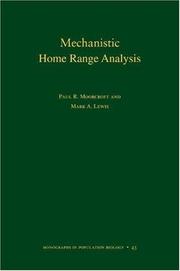| Listing 1 - 2 of 2 |
Sort by
|

ISBN: 0691009279 140084973X 9781400849734 9780691009279 9780691009285 9780691009278 0691009287 Year: 2013 Publisher: Princeton, NJ
Abstract | Keywords | Export | Availability | Bookmark
 Loading...
Loading...Choose an application
- Reference Manager
- EndNote
- RefWorks (Direct export to RefWorks)
Spatial patterns of movement are fundamental to the ecology of animal populations, influencing their social organization, mating systems, demography, and the spatial distribution of prey and competitors. However, our ability to understand the causes and consequences of animal home range patterns has been limited by the descriptive nature of the statistical models used to analyze them. In Mechanistic Home Range Analysis, Paul Moorcroft and Mark Lewis develop a radically new framework for studying animal home range patterns based on the analysis of correlated random work models for individual movement behavior. They use this framework to develop a series of mechanistic home range models for carnivore populations. The authors' analysis illustrates how, in contrast to traditional statistical home range models that merely describe pattern, mechanistic home range models can be used to discover the underlying ecological determinants of home range patterns observed in populations, make accurate predictions about how spatial distributions of home ranges will change following environmental or demographic disturbance, and analyze the functional significance of the movement strategies of individuals that give rise to observed patterns of space use. By providing researchers and graduate students of ecology and wildlife biology with a more illuminating way to analyze animal movement, Mechanistic Home Range Analysis will be an indispensable reference for years to come.
Animal behavior --- Home range (Animal geography) --- Zoogeography --- Animal distribution --- Animal geography --- Animals --- Distribution of animals, Geographical --- Geographical distribution of animals --- Zoology --- Biogeography --- Animal movement patterns --- Animal movements (Animal geography) --- Home ranges (Animal geography) --- Movement patterns of animals --- Movements of animals (Animal geography) --- Range, Home (Animal geography) --- Ranges, Home (Animal geography) --- Animals, Habits and behavior of --- Behavior, Animal --- Ethology --- Animal psychology --- Ethologists --- Psychology, Comparative --- Mathematical models. --- Geographical distribution --- Home range --- Behavior
Book
ISBN: 9781107006799 1107006791 9780511902680 9781139093170 1139093177 0511902689 9781139092142 1139092146 9781139091251 1139091255 1107221617 1283127539 9786613127532 1139092650 1139090348 Year: 2011 Publisher: Cambridge : Cambridge University Press,
Abstract | Keywords | Export | Availability | Bookmark
 Loading...
Loading...Choose an application
- Reference Manager
- EndNote
- RefWorks (Direct export to RefWorks)
Do the movements of animals, including humans, follow patterns that can be described quantitatively by simple laws of motion? If so, then why? These questions have attracted the attention of scientists in many disciplines, and stimulated debates ranging from ecological matters to queries such as 'how can there be free will if one follows a law of motion?' This is the first book on this rapidly evolving subject, introducing random searches and foraging in a way that can be understood by readers without a previous background on the subject. It reviews theory as well as experiment, addresses open problems and perspectives, and discusses applications ranging from the colonization of Madagascar by Austronesians to the diffusion of genetically modified crops. The book will interest physicists working in the field of anomalous diffusion and movement ecology as well as ecologists already familiar with the concepts and methods of statistical physics.
Appetitive Behavior --- Biophysical Phenomena --- Ecology --- Models, Statistical --- Animal behavior --- Home range (Animal geography) --- Biological invasions --- Animal ecology --- Invasions biologiques --- Mathematical models --- Modèles mathématiques --- Appetitive Behavior. --- Biophysical Phenomena. --- Ecology. --- Models, Statistical. --- Mathematical models. --- Modèles mathématiques --- Animals --- Zoology --- Bio-invasions --- Bioinvasions --- Invasions, Biological --- Natural selection --- Population biology --- Animal movement patterns --- Animal movements (Animal geography) --- Home ranges (Animal geography) --- Movement patterns of animals --- Movements of animals (Animal geography) --- Range, Home (Animal geography) --- Ranges, Home (Animal geography) --- Zoogeography --- Animals, Habits and behavior of --- Behavior, Animal --- Ethology --- Animal psychology --- Ethologists --- Psychology, Comparative --- Home range --- Behavior
| Listing 1 - 2 of 2 |
Sort by
|

 Search
Search Feedback
Feedback About UniCat
About UniCat  Help
Help News
News